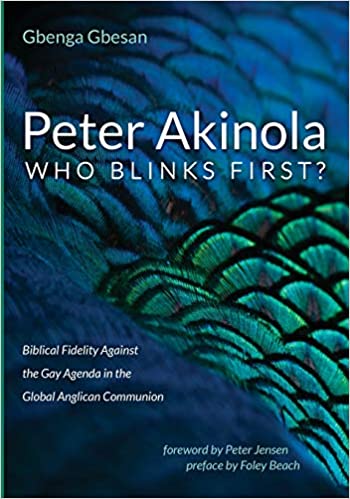A Book Review from Books At a Glance
By Mark Coppenger
In the early 2000s, Nigerian Anglican Archbishop Peter Akinola was twice recognized by Time magazine as one of the “100 Most Influential People” on earth. He had distinguished himself as the leader of the Global South’s revolt against the normalization of homosexuality by the Global North’s contingent within the worldwide Anglican Communion.
As the decennial Lambeth Conference loomed in the summer of 2020, Nigerian journalist and media consultant Gbenga Gbesan was enlisted to tell the story of Akinola’s campaign, which spanned his decade of service as archbishop, 2000-2010. The concern was that “a generation that knew not Joseph” would lose track of the struggle, with accompanying loss of traction in the perennial campaign against those dismissive of scriptural authority.
Covid-19 led Archbishop of Canterbury Justin Welby to reschedule Lambeth for the summer of 2022, but this has increased the time available to distribute copies of this book to the bishops involved. In that connection, the volume details the emergence of GAFCON (Global Anglican Future Conference), organized to extend and deepen the fight started by Akinola and his allies, and this book provides them a wealth of primary source material to make their case before a denomination which has suffered substantial loss of numbers and spiritual power in the regions where liberalism has had its sway. (GAFCON chairman Foley Beach and general secretary Peter Jensen supply, respectively, the preface and foreword to this volume.)
Akinola’s Nigerian parish enjoyed more of the faithful in churches on Sunday morning (around twenty-five million) than did all the Anglican/Episcopal churches of Europe and North America combined. Nevertheless, there were many solid adherents in the North. Consequently, in the U.S., many of them have dropped the Episcopal label and joined together in new Anglican dioceses under bishops from the southern hemisphere, e.g., CANA (Convocation of Anglicans in North America), with Nigerian leadership. (Incidentally, the website kairosjournal.org honored four of these stalwart Global South primates—Akinola, plus Gregory Venables of the “Southern Cone” of South America , Datuk Yong Ping Chung of Malaysia, and Henry Orombi or Uganda—with an awards banquet in New York City, featuring commendatory remarks delivered in person by J. I. Packer and Os Guinness.)
The subtitle, “Who Blinks First?” references an observation by Archbishop of Canterbury Rowan Williams, Akinola’s archnemesis throughout the conflict. It was not that Williams was as openly dismissive and combative as the homosexual, crusading, New Hampshire bishop Gene Robinson. Rather, he was more passive-aggressive and bureaucratically devious, a leader more disposed to speak pious words of unity and grace while pumping diesel into the gasoline tank when no one was looking. Still, the standoff was manifest, and at one point, Williams told Akinola that it came down to a matter of who would blink first. And the book does a masterful job of tracing the routes, each with feeder routes, that led these two men and their cohorts to this crossroad.
Gbesan chronicles Williams’s influences back to the work of Karl Ulrichs (the nineteenth-century, German “pioneer of the modern gay rights movement”), up through the work of Kinsey, the Mattachine Society, and the classificatory maneuvers of the American Psychological Association. These and many other personalities and developments encouraged British Columbia’s Diocese of Westminster to unilaterally bless a same-sex marriage in 2002, an event Gbesan introduces with the chapter title, “The Start of Rumblings in the House.” Soon the indulgence of homosexuality spread throughout North America, with the appointment of Katherine Jefferts Schori in 2006, who checked two boxes for the “progressives,” by joining the gay-normalization cause and by being the first woman in that role.
“Across the pond,” Rowan Williams was wending his way through scholarly and ministerial ventures to the Archbishopric of Canterbury, where he stumbled early in his tenure with his appointment of avowedly gay Jeffrey John as Bishop of Reading (Oxford), a move he had to rescind because of the furor. But it was clear where his heart lay, and he would not be deterred in helping those resolved to tear down the walls of sexual morality heretofore protecting his flock.
Meanwhile, in the Global South, Anglicans were prospering as they embraced “the faith once for all delivered to the saints.” And they could hardly believe what was unfolding in the other hemisphere. After all, it was those northerners who had brought them the Bible and told them it was vitally and unfailingly true. And now they were being told, “Never mind.” When their cries were met with condescension toward their “backwardness” and threats of funding cutoffs, their determination was strengthened, with one diocese returning money sent with rebuke from America. (The book does note that not everyone in Africa was on board with Akinola, the outstanding example being Desmond Tutu of South Africa.)
Gbesan traces the row through gatherings (communion-wide and regional; formal and informal), from Dromantine, Northern Ireland, to Kuala Lumpur, Malaysia, and he introduces us to a host of acronyms (e.g., CAPA for Council of Anglican Provinces in Africa and ACNA for Anglican Churches in North America). If one is a fan of ecclesiastical machinations, both noble and ignoble, this book is a treasure house of detail.
It is a must-read for biblically-serious Anglicans and not just for purposes of sorting out the dispute over homosexuality. As the GAFCON organizers explain, the issue is much broader than this, in that it concerns the very authority of the Bible, the integrity of the gospel, and the primacy of the Great Commission.
Of course, these are matters of concern to all who call themselves Christian, for the toxic incursions that prompted Peter Akinola to stand and fight are ever and increasingly manifested in the Church, Evangelicals included.
Mark Coppenger is Professor of Christian Apologetics (retired), the Southern Baptist Theological Seminary.
